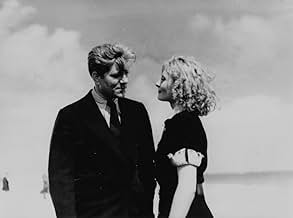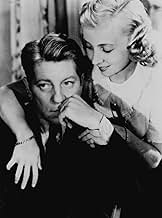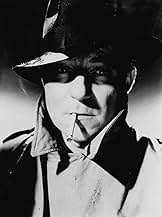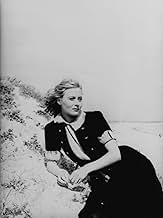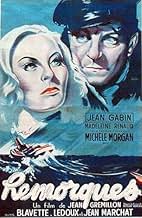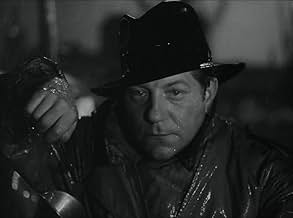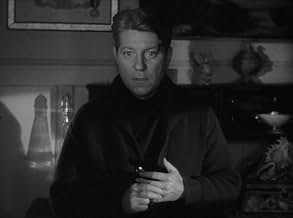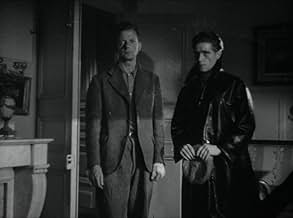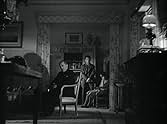IMDb-BEWERTUNG
7,2/10
1724
IHRE BEWERTUNG
André Laurent, der Kapitän eines Schleppers, heiratete Yvonne vor zehn Jahren. Sie hat eine Herzkrankheit, will es ihm aber nicht sagen. Sie träumt davon, dass er den Job kündigt, damit sie ... Alles lesenAndré Laurent, der Kapitän eines Schleppers, heiratete Yvonne vor zehn Jahren. Sie hat eine Herzkrankheit, will es ihm aber nicht sagen. Sie träumt davon, dass er den Job kündigt, damit sie ruhig leben können.André Laurent, der Kapitän eines Schleppers, heiratete Yvonne vor zehn Jahren. Sie hat eine Herzkrankheit, will es ihm aber nicht sagen. Sie träumt davon, dass er den Job kündigt, damit sie ruhig leben können.
Madeleine Renaud
- Yvonne Laurent
- (as Madeleine Renaud de la Comédie Francaise)
Charles Blavette
- Gabriel Tanguy
- (as Blavette)
Jean Dasté
- Le radio
- (as Jean Daste)
René Bergeron
- Georges
- (as Bergeron)
Henri Poupon
- Le docteur Maulette
- (as Poupon)
Marcel Pérès
- Le Meur
- (as Perez)
Marcel Duhamel
- Pierre Poubennec
- (as Duhamel)
Henri Pons
- Roger
- (as Pons)
Léonce Corne
- Un invité à la noce
- (Nicht genannt)
Lucien Coëdel
- Un marin du 'Cyclope'
- (Nicht genannt)
Henri Crémieux
- L'administrateur
- (Nicht genannt)
Empfohlene Bewertungen
Seas cover seven tenths of the terrestrial globe and have inspired painters, writers, composers and not a few film-makers and this adaptation of a novel by Roger Vercel is one of the very best of its type.
Considered by the French to be among their most gifted directors, Jean Grémillon is fated to be little known abroad except to a coterie of cinéphiles. He had envisioned a far more realistic storm sequence to be filmed in Brittany but this was deemed impracticable for health and safety reasons and he was obliged to shoot in UFA's studios at Billancourt. Nonetheless this sequence still comes off pretty well. Filming came to a grinding halt with the outbreak of war and it was not completed and released until 1941 by which time its two stars had gone to Hollywoodland.
Navigating the stormy waters of desire are Jean Gabin and Michéle Morgan, one of Cinema's most memorable couples. On-screen chemistry is hard to define but their deep fondness for each other off-screen is evident whilst her ethereal quality is perfectly allied to his earthiness. As his wife is Madeleine Renaud who was later to star in Grémillon's excellent but underrated 'Le Ciel est a vous'. Renowned as a stage actress her sporadic appearances in film represent quality over quantity. Fernand Ledoux makes the most of a thankless role and if you blink you'll miss an uncredited Alain Cuny.
Stunning cinematography by one of his nation's finest, Armand Thirard, powerful score by Roland-Manuel whilst at the insistence of Grémillon and Gabin, the screenplay has been entrusted to Jacques Prévert whose poetic/realist style is perfectly suited to this tale of doomed love and the forces of Nature.
Grémillon's ambitious projects were constantly thwarted by the constraints of commercial cinema but his comparatively small output is a legacy to be treasured.
Considered by the French to be among their most gifted directors, Jean Grémillon is fated to be little known abroad except to a coterie of cinéphiles. He had envisioned a far more realistic storm sequence to be filmed in Brittany but this was deemed impracticable for health and safety reasons and he was obliged to shoot in UFA's studios at Billancourt. Nonetheless this sequence still comes off pretty well. Filming came to a grinding halt with the outbreak of war and it was not completed and released until 1941 by which time its two stars had gone to Hollywoodland.
Navigating the stormy waters of desire are Jean Gabin and Michéle Morgan, one of Cinema's most memorable couples. On-screen chemistry is hard to define but their deep fondness for each other off-screen is evident whilst her ethereal quality is perfectly allied to his earthiness. As his wife is Madeleine Renaud who was later to star in Grémillon's excellent but underrated 'Le Ciel est a vous'. Renowned as a stage actress her sporadic appearances in film represent quality over quantity. Fernand Ledoux makes the most of a thankless role and if you blink you'll miss an uncredited Alain Cuny.
Stunning cinematography by one of his nation's finest, Armand Thirard, powerful score by Roland-Manuel whilst at the insistence of Grémillon and Gabin, the screenplay has been entrusted to Jacques Prévert whose poetic/realist style is perfectly suited to this tale of doomed love and the forces of Nature.
Grémillon's ambitious projects were constantly thwarted by the constraints of commercial cinema but his comparatively small output is a legacy to be treasured.
... from screenwriter Jacques Prevert and director Jean Gremillon. Jean Gabin stars as Andre Laurent, a rescue tugboat captain living and working in a stormy seaside village. He's 10 years married to the pleasant Yvonne (Madeleine Renaud), but he's become a bit bored and complacent with their union. On his latest rescue outing, his crew brings aboard a woman from a stranded ship. Her name is Catherine (Michele Morgan), and she's very unhappy in her marriage with the other ship's captain, a sleazy crook that she has grown to detest. Despite their better judgement, Andre and Catherine begin seeing each other.
Gabin is my favorite actor in French cinema, and this film is another example of why, as he deftly assays his role with a naturalism and honesty that eschews big showy moments but still ably projects the necessary emotion for the scene. Renaud is also good as the fragile wife, and Morgan is outstanding as the woman trapped in terrible circumstances. Director Gremillon shots a number of scenes in a visually striking manner, although the excessive use of obvious miniatures in the ships-at-stormy-seas scenes takes one out of the action a bit. Still, for a film shot over a period of three years due to a world war interrupting things, it's remarkable they accomplished what they did. Recommended.
Gabin is my favorite actor in French cinema, and this film is another example of why, as he deftly assays his role with a naturalism and honesty that eschews big showy moments but still ably projects the necessary emotion for the scene. Renaud is also good as the fragile wife, and Morgan is outstanding as the woman trapped in terrible circumstances. Director Gremillon shots a number of scenes in a visually striking manner, although the excessive use of obvious miniatures in the ships-at-stormy-seas scenes takes one out of the action a bit. Still, for a film shot over a period of three years due to a world war interrupting things, it's remarkable they accomplished what they did. Recommended.
A simple story. at first sigh, too simple. because it could seems be well known. but not the love story is the axis. but the atmosphere. the performances. the ocean. the mixture of duty, romance and clash against reality. the strange beauty of the meet between Morgan and Gabin after "Quai des brues"). and, sure, the moving end. a film who remains bitter -seductive against the decades. for its remarkable simplicity. for admirable performances. and for reasons escaping to precise definition.
Jean Gabin stars as the captain of a tugboat. On a job, he rescues Michele Morgan. Later, they begin a romance, though Gabin is married to the lovable but perpetually worried Madeleine Renaud. This is a pretty good film, though it has some major flaws. The scenes in the stormy seas (which is what the title literally means) look particularly great for the time. The major flaw, as I see it, is that the relationship between Morgan and Gabin just happens too quickly, and is thus not that believable. In the scenes between Gabin and Renaud, their relationship seems so wonderful and loving that it's hard to believe he'd dump her so quickly - like later the same day, pretty much. The film's finale is quite powerful. The performances throughout are excellent, especially Gabin's. Jacques Prevert co-wrote the script.
Andre Laurent, the captain of a tugboat, married Yvonne ten years ago. She has a heart disease but does not want to tell him. She dreams he quits his job so they can live quietly. One night, during a sea rescue, he meets Catherine. She wants to leave her husband, the captain of the rescued ship.
Jean Grémillon (1901-1959) seems to be a director who knows what he wants. He started this film as the war began (or just prior), and despite France being taken over by Germany, and having to reshoot some footage, he kept at it. And what we get is actually a really good movie. Sometimes I think Criterion releases their eclipse sets just to make a point of saying France, Japan, etc still had movies during World War II, and is not necessarily concerned about how influential or important they may be.
This one looks beautiful and surely had an impact. It reminds me of the sort of cinematography we got from the val Lewton-produced films.
Jean Grémillon (1901-1959) seems to be a director who knows what he wants. He started this film as the war began (or just prior), and despite France being taken over by Germany, and having to reshoot some footage, he kept at it. And what we get is actually a really good movie. Sometimes I think Criterion releases their eclipse sets just to make a point of saying France, Japan, etc still had movies during World War II, and is not necessarily concerned about how influential or important they may be.
This one looks beautiful and surely had an impact. It reminds me of the sort of cinematography we got from the val Lewton-produced films.
Wusstest du schon
- WissenswertesThe film's production was heavily disrupted by the Second World War. Filming started in July 1939 but was interrupted on 3 September due to France declaring war on Germany, with director Jean Grémillon and lead actor Jean Gabin being mobilized. With a special permission granted, shooting resumed on 6 May 1940 but was interrupted again in June with the German army at the gates of Paris, leading producer Joseph Lucachevitch to flee to the USA while assistant director Louis Daquin and editor Marcel Cravenne took the film reels to the south of France, in Marseille and Pau. Filming resumed for the final time under German occupation in 1941, despite both lead actors Jean Gabin and Michèle Morgan having fled to the USA and concluded on 2 September, with some planned scenes having never been shot.
- VerbindungenEdited into Spisok korabley (2008)
Top-Auswahl
Melde dich zum Bewerten an und greife auf die Watchlist für personalisierte Empfehlungen zu.
- How long is Stormy Waters?Powered by Alexa
Details
- Erscheinungsdatum
- Herkunftsland
- Offizieller Standort
- Sprache
- Auch bekannt als
- Stormy Waters
- Drehorte
- Produktionsfirmen
- Weitere beteiligte Unternehmen bei IMDbPro anzeigen
- Laufzeit1 Stunde 31 Minuten
- Farbe
- Seitenverhältnis
- 1.37 : 1
Zu dieser Seite beitragen
Bearbeitung vorschlagen oder fehlenden Inhalt hinzufügen


